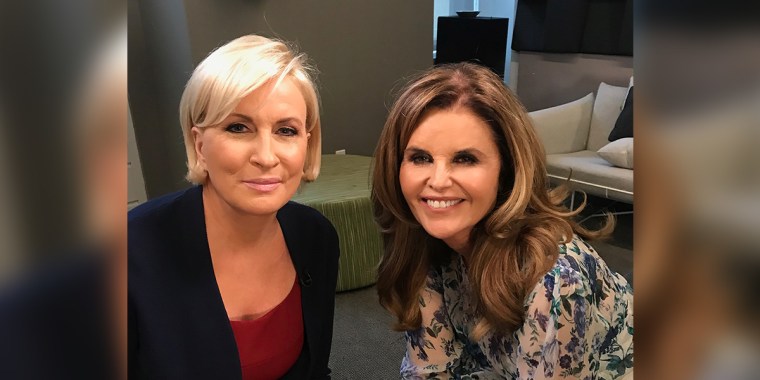Women comprise a startling two-thirds of all Alzheimer’s disease cases in the United States. And while we still don’t know exactly why women bear the brunt of the fatal cognitive disease, some hints are pointing toward hormones, lifestyle and the unique stresses on women.
In honor of Brain Awareness month, NBC special anchor and founder of the Women’s Alzheimer’s Movement Maria Shriver sat down with “Morning Joe” co-host and Know Your Value founder Mika Brzezinski. The two discussed why women should care about the disease beginning in their 20s and how we can all boost our brainpower as we age.
“If you have a brain, you should be worried about Alzheimer’s,” said Shriver, whose father suffered from the memory-destroying disease before he died in 2011.
Alzheimer’s can take root 20 years before symptoms arise, according to a study published in Lancet Neurology. This might mean that something is happening in younger women’s brains, and that perhaps Alzheimer’s can be prevented early on.
“We’re trying to look at women in their 40s, and lo and behold we’re looking at women who are perimenopausal, menopausal, and post-menopausal,” she said. “We’re trying to look at the role of stress in women’s lives at that point and estrogen ...What is going on in women’s minds and bodies?”
Shriver pointed out that around this age, in addition to hormonal fluctuations, women are at the “epicenter” of their lives. They might be caring for young kids, they’re at the height of their careers and they may be caring for aging parents. All of this adds to psychological stress — and chronic stress is a proven catalyst for Alzheimer’s.
So how do you boost brain health? Healthy eating, exercising, and keeping the mind busy with cognitive exercise is important throughout a woman’s life. Diabetes, for example, is linked to Alzheimer’s, while people on the Mediterranean diet have superior cognitive function. Poor sleep has also been linked to Alzheimer’s onset, she noted.
“In your 20s, you should be thinking about how to keep your brain healthy. We didn’t know this when I was in my 20s,” Shriver said. “There are things you can do in your 20s, 30s, 40s — you can continue to learn, keep your brain engaged and focus on your sleep because that’s when your brain clears itself.”
Corporations should also do their part to reduce stress on women, according to Shriver.
“We did a Shriver Report and asked women what was the one thing they wanted [from their companies] and they said time,” Shriver said. “Time to take parent to a doctor. Time to take myself to a doctor. Time to attend to a child...Corporate America is going to have to step into that place.”
Brzezinski noted that women also face a new psychological contender: technology.
“We’ve got a society right now that is completely surrounded inside and out with technology at the fingertips,” Brzezinski said. “Literally in the hand all day long, making that brain work harder and I think really cutting up our thought process.”
Shriver advised viewers to take big breaks from electronics in favor of face-to-face connections. Having friends has been linked to cognitive health.
“What’s good for the brain is connecting with another human being,” Shriver said. “Looking at them in the face. Feeling them. Being in conversation. One of the challenges in our country is that we age and we become more isolated.”
Shriver and Brzezinski strongly recommended meditation and mindfulness, which they both practice regularly. We don’t know exactly why women are disproportionately affected by Alzheimer’s disease, but having a mindful brain certainly doesn’t hurt. Meditation has been linked to better overall brain function.
RELATED: Mika: How I went from mindfulness skeptic to believer
“Learn meditation,” Shriver said. “I learned it really late in life, but it’s a place for your mind to settle. Your mind is now on 24-7,” she said. “I’m better doing [my work] if I know what I feel, if I’m centered, and if I can speak from a place of compassion and clarity and certainty. And that’s knowing my value.”
